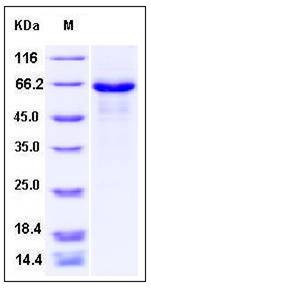Human PCSK1 / NEC1 Protein (His Tag)
BMIQ12,NEC1,PC1,PC3,SPC3
- 100ug (NPP4146) Please inquiry
| Catalog Number | P10129-H08H |
|---|---|
| Organism Species | Human |
| Host | Human Cells |
| Synonyms | BMIQ12,NEC1,PC1,PC3,SPC3 |
| Molecular Weight | The purified recombinant human PCSK1 consists of 518 amino acids after removal of the pro peptide due to autocatalytic processing, corresponding to the active form (aa 111-617), and has a predicted molecular mass of 57.4 kDa. In SDS-PAGE under reducing conditions, the apparent molecular mass of the active rh PCSK1 is approximately 66 kDa due to glycosylation. |
| predicted N | Ser 111 |
| SDS-PAGE |  |
| Purity | > 95 % as determined by SDS-PAGE |
| Protein Construction | A DNA sequence encoding the human PCSK1 (NP_000430.3) (Met 1-Arg 617) was fused with a polyhistidine tag at the C-terminus. |
| Bio-activity | |
| Research Area | Developmental Biology |Reproduction |Hormones |
| Formulation | Lyophilized from sterile 25mM Tris, 150mM NaCl, pH 7.5 1. Normally 5 % - 8 % trehalose and mannitol are added as protectants before lyophilization. Specific concentrations are included in the hardcopy of COA. |
| Background | Neuroendocrine convertase 1, also known as Prohormone convertase 1, Proprotein convertase 1, PCSK1 and NEC1, is an enzyme which belongs to the peptidase S8 family and Furin subfamily. PCSK1 is an enzyme that performs the proteolytic cleavage of prohormones to their intermediate (or sometimes completely cleaved) forms. It is present only in neuroendocrine cells such as brain, pituitary and adrenal, and most often cleaves after a pair of basic residues within prohormones but can occasionally cleave after a single arginine. It binds to a protein known as proSAAS, which also represents its endogenous inhibitor. PCSK1 is involved in the processing of hormone and other protein precursors at sites comprised of pairs of basic amino acid residues. PCSK1 substrates include POMC, renin, enkephalin, dynorphin, somatostatin and insulin. Defects in PCSK1 are the cause of proprotein convertase 1 deficiency (PC1 deficiency). PC1 deficiency is characterized by obesity, hypogonadism, hypoadrenalism, reactive hypoglycemia as well as marked small-intestinal absorptive dysfunction. It is due to impaired processing of prohormones. |
| Reference |
